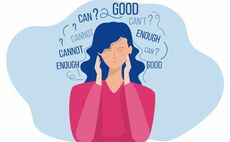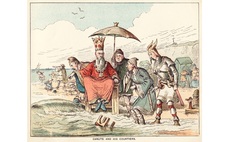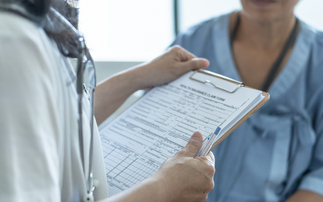Digital certification could help ease restrictions, but without a clear end point they risk overreach says data expert Caroline Carruthers
Data expert Caroline Carruthers tells Penny French why Covid passports could help life return to normal, but how aspects of their rollout are troubling
Despite being categorically ruled out in February and the subject of fierce debate throughout March and April, on May 17th Covid passports went live when the existing NHS app was quietly updated to include vaccination details. Quietly really is the word. Notice of the NHS app and its new feature was buried at the bottom of a press release issued on the same day by the Department for Transport entitled Covid-19 charter for holidaymakers launched.
The almost non-existent communication of the vaccine passport launch extends to the application it is part of. The NHS app, launched in 2018, is not widely used. According to NHS Digital, in December 2019 the app had fewer than 200,000 users. By December 2020 (the most recent month for which data is available) the app had been downloaded 1,951,640 times. Whilst a year of lockdowns obviously increased the incentive to access digital healthcare services for a significant number of people, what the figures provided by NHS Digital do not tell us, is a number of regular users, as opposed to downloads or how they are using the app.
A thoroughly unscientific poll of friends and family suggests that most assumed the vaccination passport feature was part of the NHS Covid app - not unreasonably so given the name. But this considerably more popular app which has been downloaded more than 20 million times is purely for contract tracing. Most of the people I spoke with didn't know a separate NHS app even existed. The NHS app spiked in popularity following the announcement about vaccine passports and is currently top of the download charts. Whether this popularity will be sustained is unknowable at present.
The combination of the underutilisation of the NHS app and the muted nature of the announcement on vaccine passports begs a number of questions - most of them centred on the ethics and transparency of the whole exercise.
I spoke with Caroline Carruthers, co-founder of Carruthers and Jackson, a strategic data consultancy which consults with public sector bodies and charities, as well as the private sector, on how to use and protect data effectively. Carruthers was one of the first women to take on the role of Chief Data Officer in the UK public sector when she took charge of data strategy for Network Rail. Along with Peter Jackson, she co-authored The Chief Data Officers Playbook, the second edition of which was published last December.
Carruthers is quick to point out how positively the NHS app and Covid passports could be used.
"This is an example of the NHS doing something incredibly useful," Carruthers said.
"So often in the public realm, different agencies don't talk to each other or share information. In this case, they haven't worried about which NHS Trust is doing what. This is a whole national initiative that they've pulled together, and they've done it brilliantly. I think they deserve a lot of kudos for doing that, especially given the way that we're having to work at the moment."
In addition to her admiration for the can-do spirit of the digital agencies involved, Carruthers also thinks that digital vaccination/antibody status can be used as a way to build a path back to the freedoms that we used to take for granted. Whilst she acknowledges that lockdowns were the most effective tool available to halt the spread of Covid, the bluntness of the method worries her.
"A lot of contextual information has been missing from the statistics that have been put into the public domain in order to build a certain narrative," she explained.
We need to get some kind of balance back and I'm hoping that's what the Covid apps can help us to do
"Of course, we needed to take the steps we did to get this terrible disease under some sort of control, but we haven't even started to look at the context of the other kinds of diseases that have been running rampant, because we haven't had the time to focus on them. What about the cancers that have been missed and other diagnoses that haven't happened? What about the mental health impact of locking everybody up for the best part of a year and a half? There has been a price paid by all of us and I don't think we've even started to recognise that yet.
"We need to get some kind of balance back and I'm hoping that's what the Covid apps can help us to do. I'm hoping they can help us to overcome some of the issues that lockdown created."
Carruthers believes that if Covid passports are going to fulfil their promise and help us to plot that course to living normally, two factors are of critical importance. The first is a defined end point; the second is transparency about where that end point is.
I do not want to walk around with the digital equivalent of a tattoo on my wrist that tells everybody whether I've had Covid or been vaccinated
"I do not want to walk around with the digital equivalent of a tattoo on my wrist that tells everybody whether I've had Covid or been vaccinated. This is a means to an end and when we reach that end it should stop. What will be tempting for government and public health authorities is to say, ‘well we've taken it this far, let's push a bit further.' That's where the whole transparency element comes into it. I want to see this viewed as a project with a beginning, a middle and an end. I want to know what the conditions are going to be for us to not need this anymore and to have it shut down. That's best practice. That's normal practice."
Unfortunately, Carruthers is far from convinced that this end point has been defined. The fact that the vaccination status feature was added to the NHS app with so little fanfare further fuels doubts about whether this experiment with data gathering and personal liberty is being conducted with the necessary transparency.
Those seeking greater take up of the NHS app should be appealing directly to healthcare users and explaining to them how they will keep such confidential data safe and secure, as well as what's in it for the user.
Earning trust will take time. And money. Embedding Covid passports into an app that few people regularly use could easily be interpreted as an attempt to short cut this process. Given the current download rates it seems to be working. But the ethics of effectively forcing millions of people into engaging with their healthcare providers on digital platforms, lest their access to civic life be withdrawn if they refuse are debatable.
Older people who are less likely to own the phones needed to access these apps are being made to feel like second class citizens
Carruthers points to the Covid contact tracing app for an example of how the digital divide is widening further.
"You can already see with the contact tracing app how older people who are less likely to own the phones needed to access these apps are being made to feel like second class citizens," she said
"They can't just scan their phones when they go into a venue, they have to find a pen, fill out a form etc. We are creating a two-tier society. But then, should people be penalised if they do have the ability to use the app? Why should people who are comfortable to own and use the required tech have to queue for longer because some people are reluctant to do the same? There's a whole smorgasbord of issues right there."
In addition to ethical concerns, Carruthers also voiced the more practically based consideration of whether other countries will choose to accept our Covid passports and whether it will be sufficient to avoid quarantine measures or gain entry at all. Nonetheless, hope springs eternal, and Carruthers remains optimistic that positive learnings can be found amongst the horrors of our recent past.
"I think we have learned lessons on how different agencies and government bodies can work together and actually how sometimes good enough is good enough. What I'm hoping that whatever we create is actually a little bit better than what we had."





















